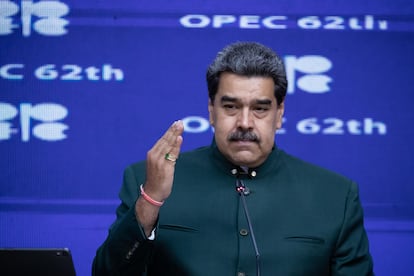UN report says Venezuela dissidents were tortured on orders from ‘highest political levels’
Fact-finding mission details crimes against humanity that were committed at covert detention centers following a system of economic rewards for the most arrests


Detainees were taken to a place known as el cerro (the hill), 30 minutes by car from the headquarters of the Directorate of Military Counterintelligence (DGCIM) in Caracas. Once there, they were given a shovel and forced to dig their own graves. Then, officials simulated shooting them by firing a few shots into the air. This place, as well as 16 other locations that include sheds, farms and ministry headquarters, have been used as covert detention centers by Venezuelan intelligence agencies, both civilian and military, according to a new report by the United Nations Independent International Fact-Finding Mission on the Bolivarian Republic of Venezuela (FFMV).
One victim told the mission that in another one of these houses, located in a Caracas suburb known as La Mariposa, he sat next to another detainee who repeatedly begged for his life. After a while, the witness, who was hooded and unable to see, heard a shot and the sound of a body falling to the ground. “The DGCIM agents who took him there started laughing and using homophobic insults before taking him back to [DGCIM headquarters] Boleíta,” says the report.
The new report, presented on Tuesday, describes patterns of action in a system designed to persecute dissidents of the government of Nicolás Maduro. The analysis is based on 122 cases that occurred in 2017, 2018 and 2019 – the years with the most arrests – after interviewing victims, witnesses and former officials of intelligence agencies.
“Our investigations and analysis show that the Venezuelan State relies on the intelligence services and its agents to repress dissent in the country. In doing so, grave crimes and human rights violations are being committed, including acts of torture and sexual violence. These practices must stop immediately, and the individuals responsible must be investigated and prosecuted in accordance with the law,” said Marta Valiñas, chair of the UN Fact-Finding Mission.
“The human rights violations by State intelligence agencies, orchestrated at the highest political levels, have taken place in a climate of almost complete impunity. The international community must do everything to ensure that victims’ rights to justice and reparations are guaranteed,” added Francisco Cox, a member of the mission.
The researchers presented previously unknown details about the chain of command used to commit torture, as well as the system of economic incentives based on number of arrests. Recruitment of torturers took place within the ranks of security agencies and also among the so-called collectives, the armed groups with sympathies for Chavismo. Among those responsible identified by interviewees are President Nicolás Maduro, First Lady Cilia Flores, the vice-president of the United Socialist Party of Venezuela (PSUV), Diosdado Cabello, and Tareck El Aissami, the current Minister of Petroleum, all of whom allegedly ordered the arrest of individuals.
The officials with the most mentions in the report, however, are Iván Hernández Dala, director of the DGCIM and head of the military department that guards Maduro, and Gustavo González, director of the Bolivarian Intelligence Service. For years they have been the target of complaints about human rights violations without being removed from their posts.
Regarding the chain of command, the report specifies: “A former FANB officer told the Mission that the orders related to non-political objectives follow the regular chain of command within the DGCIM. However, according to various sources, in the case of political objectives, President Maduro approves and sometimes also orders the detention of real and perceived opponents of the Government. A former DGCIM employee told the Mission that Hernández Dala was taking investigative reports to President Maduro for his approval.” According to the report, in 2013 Venezuelan authorities began to investigate all officers who traveled abroad to countries considered hostile, such as the United States.
So far there have been no reactions from the Maduro administration to the harsh accusations that also support a complaint of crimes against humanity that is being investigated by the International Criminal Court. Maduro instead posted a tweet to remember the late president Hugo Chávez’s notorious 2006 speech at the United Nations, in which he criticized the United States as the eternal ideological rival of the left, pointing out that the podium “smelled of sulfur” after George W. Bush’s speech.
Tu suscripción se está usando en otro dispositivo
¿Quieres añadir otro usuario a tu suscripción?
Si continúas leyendo en este dispositivo, no se podrá leer en el otro.
FlechaTu suscripción se está usando en otro dispositivo y solo puedes acceder a EL PAÍS desde un dispositivo a la vez.
Si quieres compartir tu cuenta, cambia tu suscripción a la modalidad Premium, así podrás añadir otro usuario. Cada uno accederá con su propia cuenta de email, lo que os permitirá personalizar vuestra experiencia en EL PAÍS.
¿Tienes una suscripción de empresa? Accede aquí para contratar más cuentas.
En el caso de no saber quién está usando tu cuenta, te recomendamos cambiar tu contraseña aquí.
Si decides continuar compartiendo tu cuenta, este mensaje se mostrará en tu dispositivo y en el de la otra persona que está usando tu cuenta de forma indefinida, afectando a tu experiencia de lectura. Puedes consultar aquí los términos y condiciones de la suscripción digital.








































